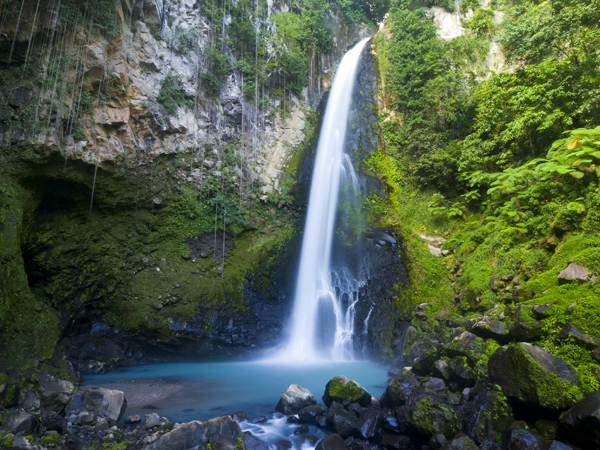
Profile

The Commonwealth of Dominica, also known as the nature island of the Caribbean, is the most northerly and largest of the Windward Islands. It is heavily forested and is renowned for its lakes, waterfalls and over 365 rivers.
The Dominican economy has largely been dependent on agriculture, primarily bananas; but government is also seeking to promote the country as an “ecotourism” destination.
The agricultural sector is a significant contributor to the economy of Dominica, contributing approximately 17%, or US $93.4 million to the country’s GDP. It is also a major source of jobs in Dominica, employing an estimated 7,000 out of the estimated 32,000 persons actively seeking employment. This represents 21% of the active work force.
Crops
An estimated 34.7% of land is used for agriculture in Dominica, with permanent crops making up 24% of that number. There is also an additional 8% of arable land. While Dominica’s rocky and mountainous terrain makes it unsuitable for plantation production, the climate, fertility, and topography are favorable for tree crops.
Dominica experienced a “banana boom” in the 1980s when it was assured access into the UK market. At that time, banana exports accounted for as much as 70% of export earnings. With the decline in the European market as an export destination, more emphasis has been placed on diversification into other crops such as citrus fruits, vegetables, coffee, cocoa, coconuts, herbal oils, extracts, patchouli, aloe vera, cut flowers, mangoes, guavas, and papayas.
Livestock
Livestock is a minor but significant contributor to the sector. Laying hens, poultry, cattle, goats, sheep, and pork are grown primarily for local consumption.
Fishing
There is a relatively large fishing industry in Dominica, but it is small-scale and almost exclusively serves the domestic market. A successful experiment in fresh-water prawn farming, supported by Taiwanese aid, has produced substantial amounts of prawns for the domestic and local markets. Japan has provided support for a fish landing and processing plant in Roseau.
Investment opportunities
The Agricultural Investment Unit (AIU)
This unit was established within the Ministry of Agriculture in 2008 for the coordination and execution of the investment plan for the non-banana agriculture sector. Its aim is to attract agro-entrepreneurs to invest in agriculture in order to increase income and employment. Areas covered under the credit scheme are:
- Livestock production
- Crop production
- Fisheries development
- Forestry related areas
This platform is used by the Government of Dominica to attract investment in manufacturing activities, with the potential to generate employment and export earning potential.
The Invest Dominica site highlights the fact that Dominica has an abundance of natural resources – water, forests, fruits, herbs, flora and fauna, which provide potential investors with several opportunities. The products derived from these resources include a number of high end niche products like bulk and bottled water and mining.
In the area of agro-processing, for example, soaps derived from coconut oil are made as well as a variety of rums and rum punches, fruit juices, essential oils, ice cream products, carbonated and non-carbonated beverages, furniture and wood products.
Businesses involved in Manufacturing can enjoy a 15-year tax holiday benefit and other incentives under the Fiscal Incentives Act. The Government of Dominica offers a very generous fiscal incentive package for investment in this area.
Main Activities
Banana production has historically employed over one-third of the labour force. In addition, CARDI has done extensive research and development in Dominica with root crops like yam, dasheen, sweet potatoes and tannia, as well as tubers, fruit crops and hot peppers. CARDI has also partnered with the Nature Island Pineapple Producers Association (NIPPA) for the development and promotion of pineapples on the island.
Agricultural Exports
In the 2014-2015 Budgetary Proposals the Prime Minister of Dominica indicated that government had constructed two pack houses, one at Portsmouth and the other in Roseau, to meet the required handling, labelling and packaging standards that are required to make products export ready.
A regime of standards and the accompanying tests has also been introduced to ensure compliance through the National Centre for Testing Excellence (NCTE).
Exports include:
- bananas
- Soap
- bay oil
- vegetables
- grapefruit
- oranges
There have also been efforts to increase cocoa production as a result of demands for cocoa for export. According to the 2014-2015 Bugetary Proposals 200 farmers have been given 10,000 cocoa plants by the Division of Agriculture. There is a target of having 300 new acres of the crop; 50 acres have been established, while 100 acres have been rehabilitated.
Organisation
- Caribbean Agricultural Research & Development Institute (CARDI)
- Ministry of Agriculture and Fisheries
| No. | Name (Acronym): | Type of Business / Role(s) | Contact Person/ Designation / Postal Address | Contact Information |
| 1 | Parry W. Bellot & Company Limited (Bello) | PRV , PS-M, PS-E | Vantil Fagan General Manager Castle Comfort P.O. Box 22 Roseau | Tel: 767 448 2860 Fax:767 448 2053 Email: pwbellot@cwdom.dm www.bellobrand.com |
| 2 | Dominica Essential Oil and Spices Cooperative Society Limited (DEOSC) | AS-F / PS-M, PS-E | Garner Elio General Manager 2 Jewel Lane P.O. Box 378 Roseau | Tel 767 448 2969 Fax: 767 448 2170 Email: deosc@cwdom.dm www.dominicaoils.com |
| 3 | Benjo’s Seamoss and Agro Processing Company Ltd. | PRV / PS-M, PS-E | John Robin General Manager P.O Box 2065, Roseau, Building 19, Industrial Site, Canefield | Tel: 767 448 1650 Fax: 767 449 8358 Email:benjoseamoss@cwdom.dm |
| 4 | Agricultural Transformation and Management Consultants Ltd | PRV, TR, TM, OT | Luke Prevost Manager 2nd Floor Prevo Cinemall P.O. Box 261 Roseau, Dominica | Tel: 767 440 2199 Email: atmc@cwdom.dm |
| 5 | Dominica Export Import Agency | EX, IN, PS-E, TR, TM, RG | Gregoire Thomas General Manager P.O. Box 173 Bayfront Roseau | Tel: 767 448 2780/3494/5 Fax: 767 448 6308 Email: dexia@cwdom.dm / info@dexia.dm www.dexia.dm |
| 6 | Agri-Sales & Services Ltd. | PRV, PS-S | Margaret George Managing Director C/o Agri Sales & Services 21 Kennedy Ave. Roseau | Tel 767 448 2748 Email:magserv2004@yahoo.com |
| 7 | 4-Dominica Ltd | PRV, PS-S, | Jason Szumlanski General Manager Goodwill Rd P.O. Box 2398 Roseau | Tel: 767 440 2915 Fax: 767 440 2916 Email:jason@4dominica.com www.4dominica.com |
Links
- FAO Country Profile – Dominica
- IICA Country Page – Dominica
- CARDI Country Page – Dominica
- Invest Dominica Manufacturing Section
- CARDI
- Ministry of Agriculture
- Ministry of Agriculture Investment Unit
- PROPEL Market Study For Fresh Produce St. Lucia, Grenada, Dominica and St. Vincent & the Grenadines
- Observatory of Economic Complexity

